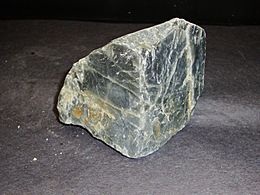Andesine facts for kids
Quick facts for kids Andesine |
|
|---|---|

Andesine
|
|
| General | |
| Category | plagioclase, feldspar, tectosilicate |
| Formula (repeating unit) |
(Ca,Na)(Al,Si)4O8, where Ca/(Ca + Na) is between 30–50% |
| Crystal symmetry | P1 |
| Unit cell | a = 8.155 Å, b = 12.9 Å, c = 9.16 Å; α = 93.917°, β = 116.3333°, γ = 89.166°; Z = 8 |
| Identification | |
| Color | White, gray, green, yellow, flesh-red |
| Crystal habit | Crystals rare, to 2 cm; commonly massive or granular |
| Crystal system | Triclinic |
| Twinning | Common following albite, pericline, and carlsbad twin laws |
| Cleavage | Perfect on {001}, good on {010} |
| Fracture | Uneven to conchoidal |
| Tenacity | Brittle |
| Mohs scale hardness | 6 – 6.5 |
| Luster | Subvitreous to pearly |
| Streak | White |
| Diaphaneity | Transparent to translucent |
| Specific gravity | 2.66 – 2.68 |
| Optical properties | Biaxial (+/-) |
| Refractive index | nα = 1.543 – 1.554 nβ = 1.547 – 1.559 nγ = 1.552 – 1.562 |
| Birefringence | δ = 0.009 |
| 2V angle | Measured: 76° to 83° |
| Diagnostic features | Requires optical/chemical analysis |
Andesine is a type of silicate mineral. It belongs to a group of minerals called plagioclase feldspars. These minerals form a "solid solution series," meaning they are a mix of different elements that can change smoothly.
Andesine's main ingredients are calcium (Ca), sodium (Na), aluminum (Al), silicon (Si), and oxygen (O). Its chemical formula is (Ca,Na)(Al,Si)4O8. The amount of calcium in Andesine is usually between 30% and 50%.
Because plagioclase feldspars are so similar, it can be tricky to tell them apart. Scientists often use special tools to study their light properties or do chemical tests. They might also measure how heavy the mineral is for its size (its density). Minerals with more calcium tend to be heavier and bend light differently.
Andesine is sometimes used as a beautiful gemstone.
Discovering Andesine's Name
Andesine was first officially described in 1841. It was found in a place called the Marmato mine in Colombia. The mineral got its name from the Andes mountains. This is because it is very common in the andesite lava rocks found there.
In the early 2000s, some red and green gemstones were sold as 'andesine'. However, it was later found that these stones had been artificially colored. This means their color was not natural.
Where Andesine is Found
Andesine is often found in certain types of igneous rocks. These are rocks formed from cooled lava or magma. Examples include diorite, syenite, and andesite.
You can also find Andesine in metamorphic rocks. These are rocks that have changed due to heat and pressure deep inside the Earth. It often appears with a special pattern called antiperthite texture. Andesine can also be found as tiny pieces in sedimentary rocks. These rocks form from layers of sediment.
Andesine is commonly found alongside other minerals. These include quartz, potassium feldspar, biotite, hornblende, and magnetite.
See also
 In Spanish: Andesina para niños
In Spanish: Andesina para niños
 | John T. Biggers |
 | Thomas Blackshear |
 | Mark Bradford |
 | Beverly Buchanan |

